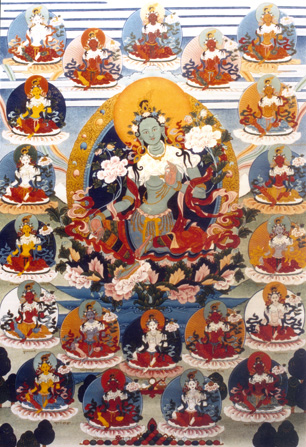Twenty-one Taras: Difference between revisions
Jump to navigation
Jump to search
No edit summary |
No edit summary |
||
| Line 6: | Line 6: | ||
#'''Sonam Chokter''' (''bsod nams mchog gter'') for the force of [[merit]] | #'''Sonam Chokter''' (''bsod nams mchog gter'') for the force of [[merit]] | ||
#'''Tsuktor Namgyal''' (''gtsug tor rnam rgyal''; Skt. [[Ushnishavijaya]]) for long life | #'''Tsuktor Namgyal''' (''gtsug tor rnam rgyal''; Skt. [[Ushnishavijaya]]) for long life | ||
#'''Rikchema''' ('' | #'''Rikchema''' (''rig byed ma''; Skt. [[Kurukulla]]) for magnetizing people and wealth | ||
#'''Jikché Chenmo''' ('''jigs byed chen mo'') for destroying the power of [[harmful influences]] | #'''Jikché Chenmo''' ('''jigs byed chen mo'') for destroying the power of [[harmful influences]] | ||
#'''Shyenkyi Mitupma''' (''gzhan gyis mi thub ma'') for protection from hailstorms and lightning | #'''Shyenkyi Mitupma''' (''gzhan gyis mi thub ma'') for protection from hailstorms and lightning | ||
Revision as of 08:59, 29 June 2010

Twenty-One Taras (Wyl. sgrol ma nyer gcig) — the twenty-one forms of Tara mentioned in the Tara tantra, together with their benefits, according to Rigdzin Jikmé Lingpa:
- Nyurma Pamo (myur ma dpa' mo) for development of bodhichitta
- Yangchenma (dbyangs can ma; Skt. Sarasvati) for knowledge and wisdom
- Sonam Chokter (bsod nams mchog gter) for the force of merit
- Tsuktor Namgyal (gtsug tor rnam rgyal; Skt. Ushnishavijaya) for long life
- Rikchema (rig byed ma; Skt. Kurukulla) for magnetizing people and wealth
- Jikché Chenmo ('jigs byed chen mo) for destroying the power of harmful influences
- Shyenkyi Mitupma (gzhan gyis mi thub ma) for protection from hailstorms and lightning
- Shyen Migyalwa (gzhan mi rgyal ba) for repelling blame
- Sengdeng Nakkyi Drolma (seng ldeng nags kyi sgrol ma; Skt. Khadiravani Tara) for protection from the eight great fears. (She is the main Tara, green in colour)
- Jikten Sumgyal ('jig rten gsum rgyal) to have power over the world
- Nor Terma (nor ster ma) for dispelling poverty and granting good fortune
- Tashi Dönché (bkra shis don byed) for the auspiciousness of children, fame, rain and so on
- Drapung Jomma (dgra spung 'joms ma) for victory in war
- Tronyer Chendze (khro gnyer can mdzad; Skt. Bhṛkuti) for protection from spirits
- Rabtu Shyiwa (rab tu zhi ba) for purifying harmful actions
- Barwé Öchen ('bar ba'i 'od can) for dispelling spells and negative effects
- Pakmé Nönam (dpag med gnon ma) for protection from robbers, thieves, animals and hunters
- Mabja Chenmo (rma bya chen mo) to protect from and neutralize poison
- Mipam Gyalmo (mi pham rgyal mo) for protection from quarrels and bad dreams
- Ritröma (ri khrod ma) for protection from epidemics
- Özer Chenma ('od zer can ma) for restoring the spirits and energies of sick people
- --From yum-ka mkha'-'gro'i nang-sgrub bde-chen snying-po'i gter-bum, based on a translation by Tulku Thondup.
There are two alternative lists of the Twenty-One Taras from the Indian tradition: one from Suryagupta and one from Nagarjuna and Atisha, in which the names, form, colour or function of protection vary.
Further Reading
- Khenchen Palden Sherab and Khenpo Tsewang Dongyal, Tara's Enlightened Activity (Snow Lion, 2007)